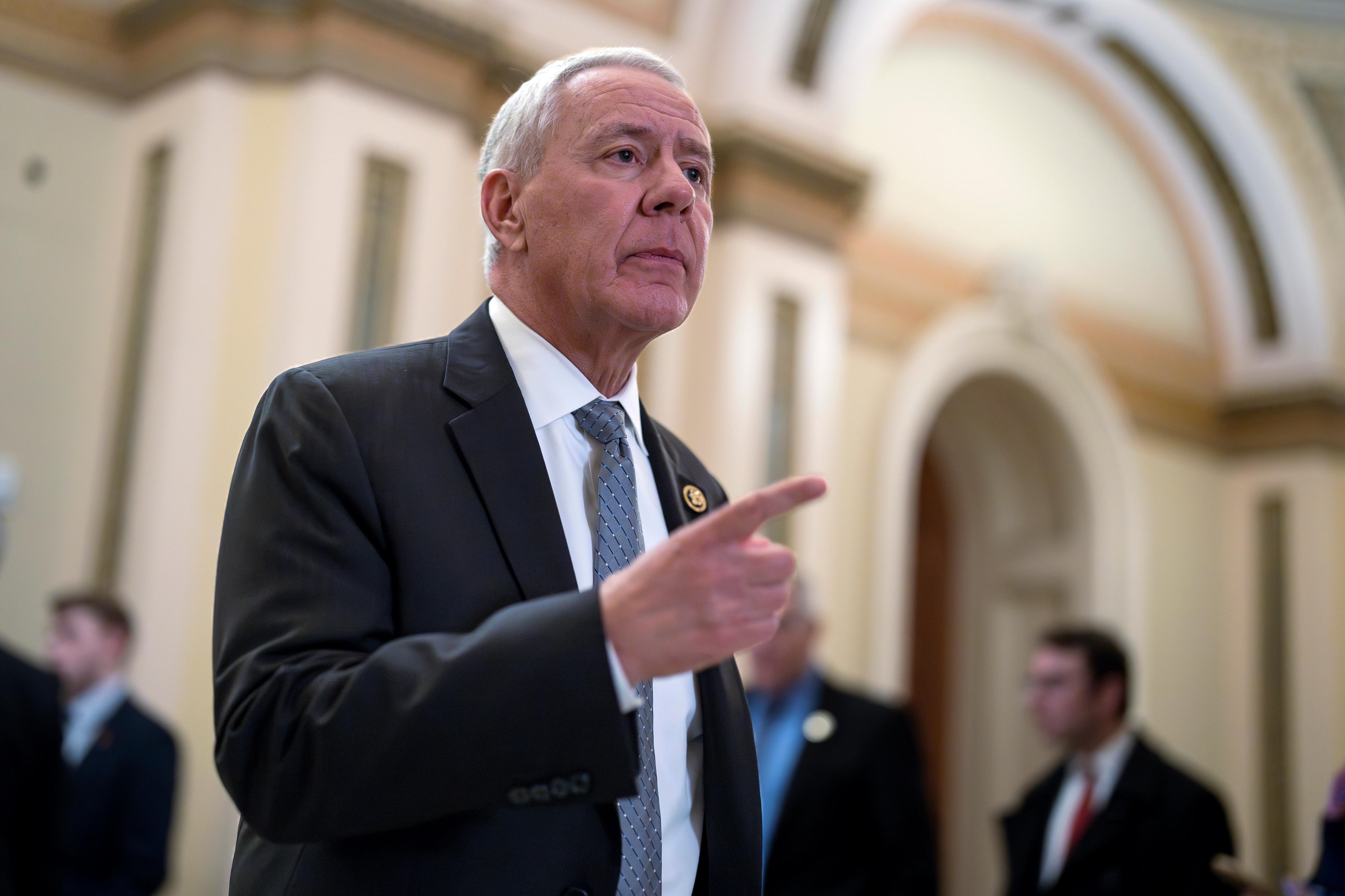
That Rep. Ken Buck’s last day in Congress will be spent dealing with a government spending bill is more than a little apropos.
The Windsor Republican came into office as part of the 2014 Tea Party wave, railing against government spending and the growing national debt. And during his almost ten years in office, he was a consistent vote against government funding bills and short-term spending measures known as CRs, irrespective of which party held power.
“I think that this place is broken when it comes to spending. There is an absolute lack of responsibility and awareness that we are going to go off a cliff if we continue to spend this way,” Buck told CPR News Thursday.
His office is now bare. The photos and the stars-and-stripes-emblazoned AR-15 that once hung on his walls are all down. A couple of bubble-wrapped mementoes sat on his desk, ready to go.
Buck announced in November that he was not going to run for reelection, but he surprised many in the political world by deciding to leave before his term was up.
“I think it’s funny that people ask me, ‘Why are you leaving so early in your career?’ I’m leaving 'cause it’s time to leave,” he said.
He has been vocal about all the ways the House has been dysfunctional. “We’ve taken impeachment and we’ve made it a social media issue as opposed to a constitutional concept. This place just keeps going downhill and I don’t need to spend my time here,” he said after announcing that March 22nd would be his last day on the job.
And like many people who are hitting the exits, Buck has pointed out all the ways Congress does not work.
“There is a series of what, I think, are dysfunctions in this institution that I am tired of. And we just covered one — spending — and there are certainly others, but the place doesn't work on behalf of the American people,” he explained.
Buck’s departure also comes after a year in which he repeatedly, and publicly, broke with the majority of his caucus. Not just on its efforts to impeach President Joe Biden, but also in his ongoing defense of the integrity of the 2020 election and his role in last fall’s Speaker fights.
For some of his Republican colleagues, Buck's decision to leave early and winnow further the already razor-thin Republican House majority is a final thumb in the eye. Rep. Lauren Boebert, who moved across the state to run to replace Buck, said his early exit “was a gift to the Uniparty. The establishment concocted a swampy backroom deal to try to rig an election.”
But Buck said a big part of his timing stems from what he wants to do next: Get better candidates to run for office up and down the ballot — starting this election cycle. “We have to make sure that the right people are attracted to run… And then, also, there are policies out there that need to change and we need to make sure we're promoting those. So process, people and policy, and that's what I'm going to be looking at in the next few months.”
The other part stems from his fiscal conservative roots. He wanted his early exit to cost taxpayers as little as possible. Holding a special election on the day of the primary is cheaper than holding it at a later date. (However, the additional election, which will likely require separate ballots, could still end up costing counties tens of thousands of dollars.)
In recent years, Republican critics have blasted Buck, once described by his political opponents as “too conservative for Colorado,” as a RINO. Earlier this week, the House Freedom Caucus, which he’s belonged to since its start, voted to kick him out, days before he was due to leave.
But Buck, who describes himself as a constitutional conservative, points to his conservative voting scorecards, where he usually ranks in the 90s.
“What I won't do is violate the Constitution and vote for impeachments that are not appropriate. What I won't do is promote a narrative about how the 2020 election was stolen when it wasn't stolen. I won't talk about how people who assaulted police officers and destroyed federal government property should not be prosecuted,” Buck explained. “Some of the people in the Freedom Caucus have an issue with me because I will not promote false narratives.”
If Buck has regrets about his years in Congress, they’re not about his voting record or that he was willing to speak out, even against his own party. It’s the time he’s lost with his kids and grandkids. “I miss my family. I miss a lot of the regular grandkid birthdays and a lot of things like that.”
He might not have gotten everything he wanted done, but he’s proud of his work, especially when it comes to his efforts trying to rein in Big Tech. In the past few years he worked on bills tackling anti-competitive practices in the digital marketplace and targeting Tiktok.
“We didn't get every antitrust bill passed, but we raised the issue and made it part of the discussion in this place and in America,” he said.
The conservative also managed to work across the aisle on some issues.
Washington Rep. Pramila Jayapal, head of the Progressive Caucus, disagrees with Buck on a lot of policy issues, but the two were able to find some common ground when it came to topics like Big Tech regulation or banning congressmembers from stock trading. She partnered with him on a digital advertising antitrust bill and described him as a “good partner.”
“I think he’s just a man of integrity and he’s been a really good friend and colleague,” she said.
Buck said there is common ground on issues in Congress — sometimes members might only find 2 percent that they can agree on, but there’s always something there.
“We found that 2 percent, and I'm really happy. And I did the same thing with other Republicans that are from more urban districts and we found common ground,” he said. “I won't compromise my core values, but I absolutely will compromise to get a half a loaf of bread and be able to work with that.”
But he also noted that's becoming harder to do, and it’s part of the reason he’s leaving early.
“I can't tell you how many people came up to me after the vote on the [Homeland Security Secretary] Mayorkas impeachment — Republicans — and said, ‘you did the right thing.’ But they were unwilling to do the right thing because they knew there would be a penalty come primary season back home,” he recalled, saying Democrats do the same, with some admitting privately the Trump impeachments were wrong. “So people recognize right from wrong here. They just won't act on it because there are political consequences.”
Buck does have one piece of advice for whoever replaces him: be true to yourself.
“The allure of power is something that people have to address early on. If that's what they're after, great. They're going to be voting the way somebody else tells 'em to vote and they're not going to be voting their conscience. And if you vote your conscience because you're true to yourself, I think you can always sleep well at night,” he said.
Buck plans to leave with his head held high, missing the people — although maybe not all of them — and not the process.
And he plans to vote “No” on that one last government spending bill.









